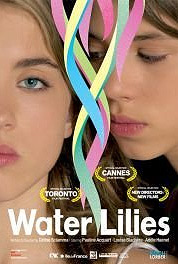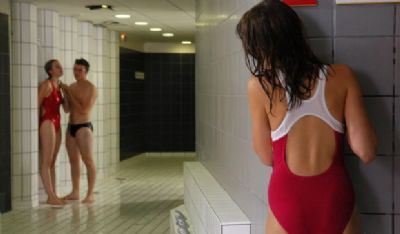 Those who say, "I wish I was young," probably don't remember just how painful being young can be. French female filmmaker Celine Sciamma remembers, and she brings the hopes and pains of early teenagers to the screen in her 2007 directorial debut. Water Lilies is an uncomfortable movie to watch as an adult. Teenagers are sometimes naked and often sexual; two things American try to avoid in our mainstream depictions of 14 and 15 year old girls. However, though Water Lilies is about young female sexuality, the young females are not sexualized. At least, not by Celine Sciamma's camera. It's an important distinction, because the film will be uncomfortably familiar to anyone who remembers their first friends, first loves, first lusts, and the heartbreaks that come from each.
Those who say, "I wish I was young," probably don't remember just how painful being young can be. French female filmmaker Celine Sciamma remembers, and she brings the hopes and pains of early teenagers to the screen in her 2007 directorial debut. Water Lilies is an uncomfortable movie to watch as an adult. Teenagers are sometimes naked and often sexual; two things American try to avoid in our mainstream depictions of 14 and 15 year old girls. However, though Water Lilies is about young female sexuality, the young females are not sexualized. At least, not by Celine Sciamma's camera. It's an important distinction, because the film will be uncomfortably familiar to anyone who remembers their first friends, first loves, first lusts, and the heartbreaks that come from each.
Water Lilies circles around the awakening of two girls from the French suburbs. Anne (Louise Blachere) is a big-boned synchronized swimmer whose weight and clumsiness put her in the lowest ranks of the team, socially and competitively. Her best friend is Marie (Pauline Acquart), a slight, mousy tomboy who says little but watches everything. They play with Happy Meals with toy spyglasses and spit water at each other for fun like kids do, but they're also beginning to develop feelings: Anne for Francois, the captain of the boy's water polo team, and Marie for the star of the synchronized swimmers, a beautiful girl with a bad reputation named Floriane (Adele Haenel). Unlike Marie and Anne, Floriane understands what desire is, or at least how to recognize when someone desires her. She's known since the adult swim coach started chasing her around the room. What Floriane doesn't know is what she herself wants. [More...]

Celine Sciamma uses these three girls to show the ways young women try to navigate a world that commodifies desire and places youth and beauty on a pedestal. Early on, a fellow swimmer tells Marie that Floriane is beautiful, so she must be a slut. In fact, Floriane is a virgin who is afraid of sex, while Anne trades her own virginity in order to get her first kiss. Meanwhile Marie runs towards her crush on Floriane almost as quickly as she backs away from it. Sex is inextricably linked to power, but the adult dynamics of desire are too complicated for these scared little girls to totally understand yet.
Sciamma shows this best in her empathetic exploration of voyeurism. Though often characters are caught looking at each other, Sciamma shows that it's not always the one doing the watching that holds the power. Anne wants Francois because he saw her naked. His view of her made her want him. On the other hand, for all of Marie's spying on Floriane, it's Floriane who controls their friendship. But Floriane manipulates Marie's actions (and her gaze) because she can't control the adult men who lust after her even as they call her a slut. Sciamma's camera is never as predatory as the adults in the film. Her cinematography is crisp, with occasionally startling moments (such as a synchronized swim routine underwater) as the girls watch each other.

While Celine Sciamma is careful never to stray too far beyond Anne and Marie's point of view, she still affords herself occasional editorial comments. At one point, a (female) coach berates a swimmer for her sloppy shaving with, "is that what you'll tell your husband?" Instead, she captures the girls as they are: self-conscious, but un-self-aware, and still learning how they fit in their own skin. While the film can feel occasionally meandering, Sciamma's first feature shows the director's understanding of how girls see each other, and how the world sees them. Sciamma's understanding of how gender is tied to perception will be crucial, since her next feature subject is not actually a girl at all.

12/24: Tomboy - Celine Sciamma's second takes on the sensitive subject of trans identity in childhood. (Amazon Prime)
12/31: Girlhood - Celine Sciamma's latest looks at the relationships girls develop with each other in a contemporary girl's gang. (Amazon Prime)